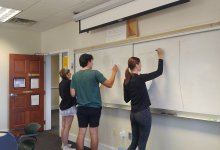Critical Thinking
Whether via classroom discussions, analysis of written text, higher-order questioning, or other strategies, learn and share ways to help students go deeper with their thinking.
Notice and Wonder in Kindergarten Math
Activities that allow young students to engage visually instead of through text maximize productive struggle and improve critical thinking.494Using Picture Books to Teach Children About Large Numbers
These strategies help elementary students grapple with the very large numbers involved in talking about time and space.Exploring Before Explaining Sparks Learning
New elementary science teachers can build student engagement and enhance learning by using the explore-before-explain approach.How Storytelling About Learning Empowers Students
Turning learning moments like mistakes into stories can help elementary students develop a sense of efficacy.290How to Turn Your Math Classroom Into a ‘Thinking Classroom’
The researcher Peter Liljedahl evangelizes for practices that prioritize and stimulate more hard thinking in classrooms.3.1kA Collaborative Approach to Mistake Analysis
This method calls for students working in groups to create problems, point out common errors, find solutions, and then explain the process.2.2kUsing Fairy Tales to Inspire Wonder in Kindergarten
The enchanting nature of fairy tales can foster collaboration, critical thinking, communication, and creativity in young learners.4135 Ways to Stop Thinking for Your Students
Too often math students lean on teachers to think for them, but there are some simple ways to guide them to think for themselves.4.4kUsing Differentiation to Challenge All Students
Whether students are ahead of their peers or behind, differentiation should ensure that all learners engage in critical thinking.1.2kTurning Students Into Bold Historical Thinkers
By collapsing the distance between historical eras and the present day, we motivate students to ask hard questions and dig deeper into the past.493Review Session Games That Work
Game-based review sessions can increase student engagement—and are backed by learning science.1kWhy Students Should Write in All Subjects
Writing improves learning by consolidating information in long-term memory, researchers explain. Plus, five engaging writing activities to use in all subjects.16.5kPreparing Students to Take Their Presentations to the Next Level
With the right preparation, students can be ready for any audience question—even if they don’t know all the answers.442Sparking Students’ Curiosity to Enhance Their Problem-Solving Skills
Curiosity about small questions, or micowonderings, can help students solve problems in any discipline.5194 Strategies for Sparking Critical Thinking in Young Students
Fostering investigative conversation in grades K–2 isn’t easy, but it can be a great vehicle to promote critical thinking.503














